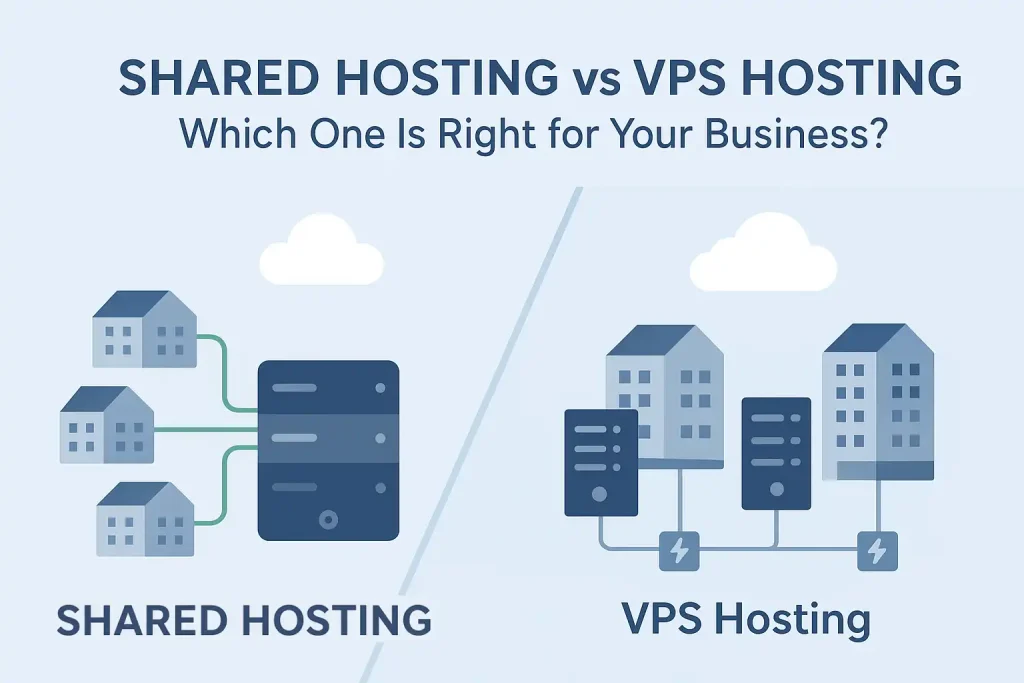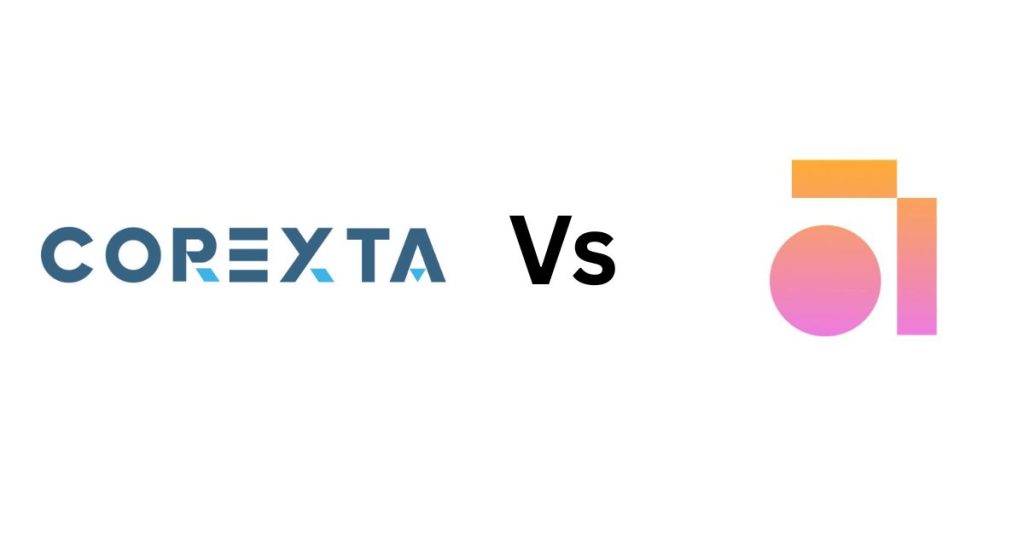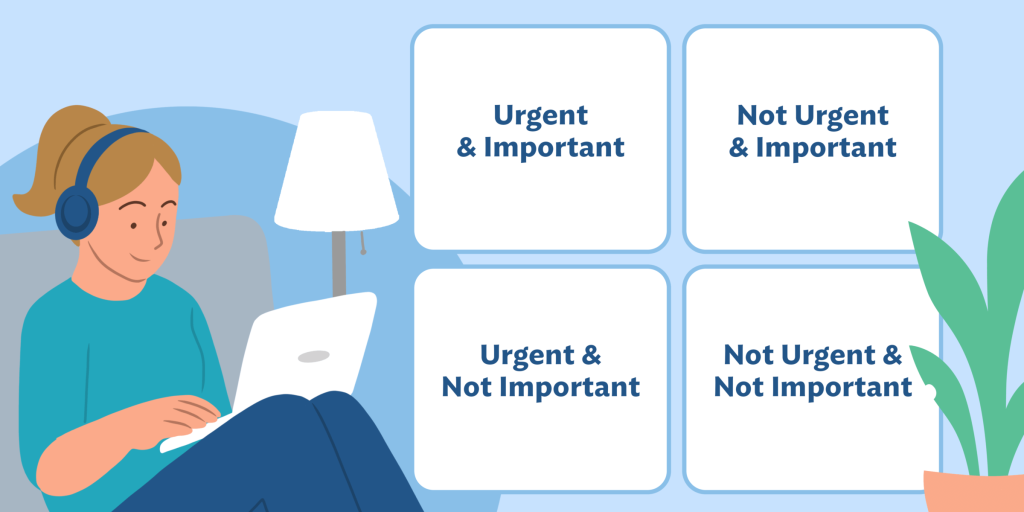Choosing between Shared Hosting vs VPS Hosting is one of the most important decisions for any business website. Your hosting isn’t just a place where your site “lives”—it directly impacts how fast your pages load, how secure your data is, and how well your site can handle growth. For small businesses especially, this choice can make the difference between a smooth, professional online presence and a frustrating, underperforming website.
When comparing shared hosting vs VPS, it’s easy to feel overwhelmed by the jargon. Shared hosting is often the entry point for startups and small websites, offering affordability and simplicity. On the other hand, VPS (Virtual Private Server) hosting provides more control, better performance, and scalability—but at a higher cost. Each option has its pros and cons, and the right one depends on your business goals, traffic expectations, and budget.
In this article, we’ll break down the differences between shared hosting and VPS hosting in clear, practical terms. You’ll learn:
How each hosting type works behind the scenes
The pros and cons of shared hosting vs VPS for small businesses
Key factors like speed, security, cost, and scalability
Which hosting option is the smarter choice for your business needs
By the end, you’ll have a clear roadmap to confidently choose the best hosting plan for your website.
Understanding Shared Hosting: The Budget-Friendly Starting Point
When people first launch a website, they often start with shared hosting—and for good reason. In simple terms, shared hosting means that multiple websites live on the same physical server and share its resources (like storage, bandwidth, and CPU power).
Think of it like living in an apartment building. You have your own unit where you can decorate, cook, and relax, but you’re sharing the building’s electricity, water, and Wi-Fi with all the other tenants. As long as everyone uses a fair amount, things run smoothly. But if one neighbor hogs the bandwidth, the rest may notice slower service.
✅ Pros of Shared Hosting
- Affordability – Shared hosting is the cheapest option, often just a few dollars per month.
- Ease of Use – Most providers include user-friendly dashboards and one-click installations for WordPress or other CMS platforms.
- Managed Setup – Maintenance tasks like server monitoring, updates, and security patches are handled by the hosting company.
- Beginner-Friendly – Perfect for small businesses, personal blogs, or portfolio sites that don’t need huge amounts of resources.
⚠️ Cons of Shared Hosting
- Limited Resources – Because resources are shared, your site might slow down if other websites on the server use too much.
- Performance Bottlenecks – Shared servers can’t always handle traffic spikes well.
- Security Risks – If one site on the server is hacked, there’s a higher risk of cross-contamination.
- Less Control – Limited access to server configurations compared to advanced plans like VPS.
🏢 Who Benefits Most?
Shared hosting is a smart choice for startups, small blogs, portfolios, or local business websites that receive light to moderate traffic. It gives you a reliable, budget-friendly foundation while you’re getting your online presence off the ground.
What Is VPS Hosting and Why It’s a Step Up
If shared hosting is like living in an apartment building, then VPS hosting (Virtual Private Server) is more like owning a condo. You’re still part of a larger complex, but you have your own dedicated space and resources. No neighbor can hog your water supply or electricity—you get a guaranteed share.
With VPS hosting, a single physical server is divided into multiple “virtual” servers using virtualization technology. Each VPS has its own dedicated CPU, RAM, storage, and operating system. That means you get more control and consistency compared to shared hosting, where everything is pooled together.
✅ Benefits of VPS Hosting
- Dedicated Resources – Unlike shared hosting, your site won’t be slowed down by others on the server.
- Better Performance – With guaranteed RAM and CPU, your website can handle more visitors and heavier workloads.
- Root Access – You can install custom software, adjust server settings, and fine-tune performance.
- Scalability – Easily upgrade resources as your business grows, without migrating to a new server.
- Improved Security – Isolated environments reduce risks from other websites on the same server.
⚠️ Drawbacks of VPS Hosting
- Higher Cost – VPS hosting is more expensive than shared hosting, though still cheaper than a dedicated server.
- Technical Skills Required – Some VPS plans require server management knowledge, though many hosts now offer “managed VPS” for beginners.
- Maintenance Responsibility – You may need to handle updates, patches, and troubleshooting if unmanaged.
🏢 Who Benefits Most?
VPS hosting is ideal for businesses that have outgrown shared hosting—such as e-commerce stores, SaaS startups, agencies, or content-heavy websites. If you’re seeing traffic spikes, need stronger security, or want more control, VPS hosting provides the reliability and flexibility to support your growth.
Shared Hosting vs VPS: A Side-by-Side Comparison
When deciding between shared hosting vs VPS, the best way to evaluate them is to compare side by side. Each option has strengths and trade-offs, and the right choice depends on your budget, technical skills, and growth plans.
Here’s a breakdown across the key factors:
| Feature | Shared Hosting 🏠 (Apartment) | VPS Hosting 🏢 (Condo) |
|---|---|---|
| Cost | Very low ($3–$10/month). Best for tight budgets. | Higher ($20–$80+/month). Scales with resources. |
| Performance | Shared resources can slow down under heavy load. | Dedicated CPU/RAM ensures consistent performance. |
| Security | Risks from neighbors if one site is compromised. | Isolated environment with stronger protection. |
| Scalability | Limited. Upgrading often requires switching plans. | Easy to scale RAM, CPU, and storage as traffic grows. |
| Control | Minimal—basic settings only. | Root access allows full customization. |
| Server Admin | Fully managed by host; little technical work. | Can be self-managed or managed VPS depending on provider. |
🏢 Real-World Use Cases
- Shared Hosting:
Perfect for a small bakery launching its first website, a freelancer showcasing a portfolio, or a local blog with light traffic. It’s budget-friendly and requires no tech expertise. - VPS Hosting:
Ideal for a growing e-commerce store expecting seasonal spikes, a SaaS startup with thousands of users, or an agency managing multiple client sites. The scalability and control help businesses stay reliable as demand increases.
In short: shared hosting is best for small-scale, low-traffic websites starting out, while VPS hosting gives you the dedicated resources and flexibility needed once your business grows.
Shared Hosting: Best Use Cases for Small Businesses
Not every website needs the power of VPS hosting. For many small businesses and individuals, shared hosting is the perfect starting point. It offers affordability, simplicity, and just enough resources to keep a smaller site running smoothly. If you’re just getting started, web hosting for small business from trusted providers like MilesWeb can give you a solid foundation with minimal cost and hassle.
✅ Ideal Scenarios for Shared Hosting
- Small Businesses & Startups – Perfect for local shops, service providers, or entrepreneurs launching their first site.
- Personal Blogs & Portfolios – Writers, designers, and freelancers can showcase their work without breaking the bank.
- Low-Traffic Websites – Works best for sites with fewer than 20,000–25,000 monthly visitors.
- Tight Budgets – Plans often start as low as $3–$10 per month, making it the most affordable entry point.
- Beginner-Friendly Setup – Hosting providers usually offer one-click installations for WordPress and drag-and-drop website builders.
- No Technical Experience Needed – The hosting company handles server maintenance, updates, and security patches.
📝 Shared Hosting Suitability Checklist
Ask yourself these quick questions:
- Will my site attract fewer than 25k visitors per month?
- Am I working with a limited hosting budget?
- Do I prefer a hosting plan that’s managed for me?
- Is my website relatively simple (no heavy apps or complex databases)?
- Am I just starting out online with a blog, portfolio, or small business site?
👉 If you answered “yes” to most of these, shared hosting is likely the right choice for now. It gives you a reliable, beginner-friendly foundation without unnecessary complexity or high costs.
As your traffic and business needs grow, you can always upgrade to VPS or another scalable hosting option later.
VPS Hosting: When Your Business Needs More Power
At some point, shared hosting may no longer be enough to keep up with your website’s demands. That’s where VPS hosting comes in—a scalable solution that gives your business the performance, security, and control it needs to grow.
✅ Ideal Scenarios for VPS Hosting
- Growing Businesses – If your website is attracting 25k+ visitors per month or handling large traffic spikes.
- E-commerce Stores – Online shops need fast load times, secure transactions, and the ability to handle multiple users at once.
- Agencies & Developers – Perfect for managing multiple client websites with more control over server settings.
- High-Traffic Blogs or Media Sites – Consistent traffic or viral content requires resources that shared hosting can’t provide.
- Resource-Heavy Applications – Web apps, SaaS platforms, or learning portals that need dedicated RAM and CPU.
- Security-Sensitive Projects – Businesses handling sensitive customer data benefit from VPS isolation and advanced configurations.
📝 VPS Hosting Suitability Checklist
Ask yourself these questions to see if VPS hosting is right for you:
- Am I receiving more than 25k visitors a month?
- Do I run an e-commerce store or revenue-critical website?
- Does my website slow down during peak traffic times?
- Do I need more control (root access, custom apps, advanced settings)?
- Is stronger security a must for my business?
- Am I planning for rapid growth or scalability?
👉 If you answered “yes” to most of these, VPS hosting is likely the smarter investment. It costs more than shared hosting, but the performance, scalability, and control pay off—especially for businesses that rely heavily on their online presence.
How Performance and Security Differ in Shared vs VPS Hosting
When deciding between shared hosting vs VPS, two of the most critical factors are performance and security. These directly impact how your website runs day to day—and how safe your data (and your customers’ data) will be.
🚦 Performance: Speed & Stability
- Shared Hosting:
- Resources (CPU, RAM, bandwidth) are shared across many websites on the same server.
- If one site experiences a traffic spike, your site may slow down or even crash.
- Suitable for low-traffic websites, but not for businesses that rely on consistent uptime.
- VPS Hosting:
- Each VPS has dedicated resources, so your performance isn’t affected by other websites.
- Handles traffic spikes more reliably with guaranteed CPU and RAM.
- Much faster page load times, improving SEO rankings and user experience.
Example: An online store on shared hosting may lag on Black Friday sales, while a VPS-powered site stays responsive.
🔒 Security: Risks & Protections
- Shared Hosting:
- All users share the same server environment. If one website is hacked or infected with malware, neighboring sites can be at risk.
- Limited control over server-level security.
- Providers usually offer basic protections, but vulnerabilities spread more easily.
- VPS Hosting:
- Isolated environment: Each VPS is separated, so other websites can’t compromise your security.
- Greater control: You can configure firewalls, install security tools, and enforce stricter policies.
- Ideal for businesses handling sensitive data (eCommerce, healthcare, finance).
📊 Uptime & Reliability
- Shared Hosting: Generally comes with uptime guarantees (often 99.9%), but performance fluctuations may affect real-world reliability.
- VPS Hosting: Stronger uptime guarantees and more consistent performance, since your resources aren’t competing with others.
👉 Bottom line: Shared hosting may be fine for personal or hobby websites, but for businesses that value performance, customer trust, and data protection, VPS hosting is the safer and more reliable choice.
Scaling Your Website: Shared Hosting vs VPS Hosting
One of the biggest questions small business owners face is: “Will my hosting grow with my business?” When comparing shared hosting vs VPS, scalability and flexibility are key factors that determine how future-proof your hosting choice is.
📈 Shared Hosting: Limited Growth Potential
- Fixed Resources: Shared hosting plans usually come with strict resource caps (CPU, RAM, bandwidth).
- Upgrade Options: The only way to “scale” is to jump to a higher shared hosting tier—but even premium shared plans still mean competing with neighbors on the same server.
- Who It Works For: Perfect for beginners, small blogs, or websites expecting steady, low traffic. But if traffic doubles or triples, performance quickly suffers.
Example: A freelance photographer may start with shared hosting for their portfolio. But when they add an online booking system and see a surge in traffic, their site slows to a crawl.
🚀 VPS Hosting: Built for Growth
- On-Demand Upgrades: VPS hosting allows you to increase CPU, RAM, and storage with just a few clicks. No need to migrate servers.
- Flexible Configurations: Choose exactly how much power you need and adjust as your business grows.
- Future-Proofing: Perfect for startups or growing businesses that expect higher traffic, larger databases, or more complex applications.
Example: An eCommerce brand that starts with 500 visitors a month can easily scale to handle 50,000 monthly visitors on VPS by upgrading resources—without switching providers.
⚖️ Bottom Line
- Shared Hosting: Affordable and beginner-friendly, but limited in how much it can grow with you.
- VPS Hosting: Offers the scalability and flexibility modern businesses need, ensuring your site keeps running smoothly as your audience expands.
👉 If you’re planning for growth, VPS is the smarter long-term choice.
Do You Need Tech Skills for VPS Hosting?
When deciding between shared hosting vs VPS hosting, one of the most overlooked factors is the technical skill requirement. Hosting isn’t just about speed or cost—it’s also about whether you (or your team) can manage the environment effectively.
🖥️ Shared Hosting: Zero Tech Skills Needed
- Fully Managed by the Host: In shared hosting, the provider handles everything—server setup, maintenance, updates, and security patches.
- Simple Control Panels: Most providers offer beginner-friendly dashboards like cPanel or hPanel, making it easy to install WordPress, add email accounts, and manage files without coding knowledge.
- Who It’s For: Beginners, small business owners, or anyone who wants a “set it and forget it” hosting experience.
⚙️ VPS Hosting: More Control, More Responsibility
- Server Management Required: With VPS, you’re essentially running a mini server. That means handling tasks like updates, software installation, and security hardening.
- Root Access: This level of control gives you more flexibility but also requires technical knowledge to avoid misconfigurations.
- Learning Curve: If you’re not familiar with server commands or software stacks (Apache, Nginx, MySQL, PHP), VPS may feel overwhelming.
🤝 Managed VPS: The Middle Ground
- Provider Takes Over Maintenance: Managed VPS hosting solves the technical barrier by letting the hosting company handle server updates, monitoring, backups, and security.
- User-Friendly Panels: With tools like cPanel, hPanel, or SPanel, you still get a simple interface to manage websites, databases, and emails without diving into command lines.
- Best of Both Worlds: You keep the performance and scalability of VPS while offloading technical headaches to professionals.
⚖️ Bottom Line
- Shared Hosting = No skills required, but limited control.
- VPS Hosting (Unmanaged) = Full control, but technical expertise needed.
- Managed VPS Hosting = Ideal balance—scalability and control without requiring a developer on your team.
👉 If you’re non-technical but want the power of VPS, go for a Managed VPS plan with a reliable control panel.
Shared Hosting vs VPS Hosting: What’s the Real Cost?
When evaluating shared hosting vs VPS hosting, cost is often the first deciding factor for small businesses and startups. While shared hosting is clearly the cheaper entry point, VPS hosting can deliver more value in the long run depending on your growth and needs.
💰 Shared Hosting Pricing
- Entry-Level Plans: Usually range between $2 – $10/month.
- What’s Included: Basic storage (10–50 GB), limited bandwidth, free SSL certificates, and often one-click WordPress installs.
- Who Benefits: Small websites, blogs, or startups on a tight budget.
⚠️ Hidden Costs:
- Renewal rates often jump significantly after the first year.
- Backups and security add-ons may cost extra.
- Customer support tiers (priority or advanced support) may come at an additional price.
💼 VPS Hosting Pricing
- Basic VPS Plans: Typically start at $20 – $60/month.
- Mid-Range & High-Performance Plans: Can go from $100 – $400/month depending on CPU, RAM, and storage allocation.
- What’s Included: Dedicated resources, root access, advanced scalability, and improved security features.
⚠️ Hidden Costs:
- Managed VPS services (where the host takes care of updates, monitoring, and backups) can add an extra $20 – $100/month.
- Additional licenses for software (cPanel, Windows Server, etc.).
- Professional support or custom server configuration.
📈 ROI Considerations
- Shared Hosting ROI:
- Great for testing ideas, running small blogs, or portfolio sites.
- Low upfront cost, but limited scalability—so as your traffic grows, you’ll need to upgrade.
- VPS Hosting ROI:
- Designed for growing businesses, eCommerce, and agencies.
- While more expensive, it saves costs on downtime, performance issues, and lost sales opportunities.
- Provides a more professional user experience, which directly impacts conversions.
⚖️ Bottom Line
- Shared Hosting is the cheapest way to get started, but long-term value is limited.
- VPS Hosting requires more investment but pays off with better performance, scalability, and security.
👉 Think of shared hosting as a short-term budget option, while VPS hosting is a long-term business investment.
Frequently Aked Questions About Shared Hosting vs VPS
When researching shared hosting vs VPS, most business owners run into the same set of questions. Let’s break them down clearly so you can make an informed decision.
❓ When should I upgrade from shared to VPS?
You should consider upgrading when:
- Your traffic consistently exceeds 20,000–25,000 monthly visitors.
- Your site slows down during peak hours.
- You’re running eCommerce, membership platforms, or apps that need more resources.
- Security is critical (e.g., handling payments or sensitive data).
In short: if performance issues or downtime could cost your business sales or credibility, it’s time to move to VPS.
❓ Is shared hosting bad for SEO?
Not inherently. Shared hosting doesn’t directly hurt SEO, but it can indirectly affect rankings through:
- Slow loading times during traffic spikes.
- Downtime caused by other websites on the server.
- Potential security risks like malware spreading from neighboring sites.
Google prioritizes fast, reliable websites, so if your shared hosting plan starts causing delays, it could impact SEO performance.
❓ Can I host multiple websites on VPS?
Yes. VPS hosting is ideal for managing multiple sites because you control how resources (CPU, RAM, storage) are allocated. For example:
- Agencies can run client websites under one VPS.
- Entrepreneurs can host multiple brands or projects efficiently.
Shared hosting also allows multiple sites, but performance often suffers when you go beyond one or two medium-sized websites.
❓ What’s the difference between managed and unmanaged VPS?
- Managed VPS:
- Hosting provider handles updates, server monitoring, security patches, and backups.
- Ideal for non-technical users or businesses that don’t have an IT team.
- Unmanaged VPS:
- You’re responsible for installation, configuration, security, and maintenance.
- Cheaper, but requires technical expertise.
❓ Is VPS faster than shared hosting?
Yes, VPS is faster because you get dedicated CPU and RAM, unlike shared hosting where resources are split across many sites. Faster speed improves SEO rankings and user experience.
👉 If you’re not comfortable handling server management tasks, a managed VPS will save you time and headaches.
Final Verdict: Which Hosting Is Right for Your Business?
Choosing between shared hosting vs VPS isn’t just about price—it’s about finding the right balance of performance, security, and scalability for your business. Both options have their place:
- Shared hosting is like renting an apartment: affordable, beginner-friendly, and easy to maintain, but with shared resources and some limitations.
- VPS hosting is more like owning a condo: you get dedicated space, more control, and better performance, but it comes at a higher cost and sometimes requires more technical know-how.
✅ Quick Decision Checklist
Ask yourself these questions to guide your choice:
- Traffic: Do you get fewer than 25,000 visits per month? → Shared hosting may be enough.
- Budget: Are you keeping costs low as a startup or hobby site? → Shared hosting works well.
- Performance Needs: Do you run eCommerce, agency sites, or apps that can’t afford downtime? → VPS hosting is the better fit.
- Security: Do you handle sensitive data or online payments? → VPS provides stronger isolation and protection.
- Tech Skills: Do you want a hands-off solution? → Choose managed shared hosting or managed VPS, depending on your growth stage.
🚀 Final Thought
Your hosting plan is the foundation of your online business. If you’re just starting out, shared hosting offers an easy entry point. But as your business grows, VPS hosting ensures that speed, security, and scalability grow with you.
👉 Take a moment to assess your traffic, budget, and long-term goals then choose the hosting plan that sets your business up for success.
Other Hosting Types to Consider
When exploring web hosting types, shared hosting and VPS are the most common starting points. But they aren’t your only options. Depending on your business goals, traffic demands, and technical needs, you may want to explore these alternatives:
☁️ Cloud Hosting
Cloud hosting uses multiple servers working together to host your site. This setup offers scalability, flexibility, and reliability—perfect for businesses expecting unpredictable traffic spikes. Unlike shared hosting, you’re not limited by a single server’s resources.
🖥️ Dedicated Hosting
Think of this as having an entire house to yourself. With dedicated hosting, you rent a whole server, giving you maximum performance, security, and customization. This is ideal for large enterprises, busy eCommerce stores, or resource-heavy apps. The trade-off? It’s one of the most expensive options.
🌐 Managed WordPress Hosting
If your website is built on WordPress, this option is designed specifically for you. Managed WordPress hosting includes optimized servers, automatic updates, and built-in security tailored for WordPress sites. It’s beginner-friendly and performance-focused but often pricier than shared hosting.
Each of these hosting types offers unique benefits that may outgrow the limitations of shared hosting or VPS. If you’re considering advanced options, be sure to weigh your site’s traffic, growth potential, and budget before making the jump.










